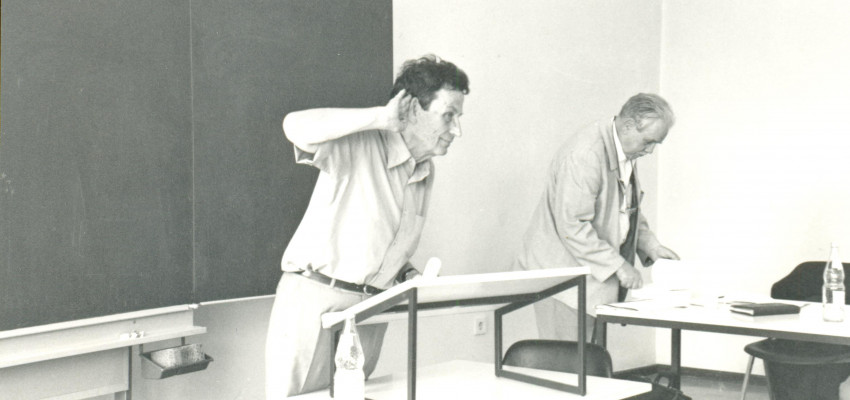A Research Scholarship Title "Turkish Studies" from Vienna University for Commemorating of Andreas Tietze from Vienna University
University of Vienna, Department of Near Eastern Studies programmed a research scholarship titled "Turkish Studies" on behalf of famous Turcologist Prof. Dr. Andreas Tietze, TÜBA Member to commemorate Andreas Tietze's life and work. The fellowship aims to ensure that Tietze's name is always associated with the outstanding research conducted by promising academics at the Department of Near Eastern Studies at the University of Vienna.
TÜBA's contribution to science diplomacy
Prof. Dr. Muzaffer Şeker President of TÜBA said: “Prof. Andreas Tietze has very large contribution to the Turkey Turkish and also provided an important work to the Turcology world titled "Historical and etymological Turkey Turkish Lugati". He recalled that TÜBA published his grand work in 10 Volumes. He also said: “I find very important in terms of science diplomacy that Vienna University provided the "Andreas Tietze Turkish Studies Memorial Scholarship”. All these activities once reveal us how great a scientist he is, even after Tietze's death.”
As a world-renowned Austrian Turcologist, Prof. Andreas Teitze was born in Vienna and also educated in Vienna, but he started his career at Istanbul University, where he took refuge in the Hitler regime from 1938 to 1958. Since 1958, he started at the University of California, Los Angeles, where he was a professor. After the long years he spent in Turkey and the United States in 1973 as professor Turcology returned to the University of Vienna. He worked as a faculty member at the Department of Near Eastern Studies until his retirement in 1984.
He has published books and articles on many subjects ranging from lexicology and etymology to history and folk dance. In addition, he received many awards for his important contributions to the field of Turkish studies.
The sholarship "Andreas Tietze Turkish Studies Memorial Scholarship” planned annually basis and is open to advanced doctoral candidates and postdoctoral / early stage researchers working on a specific subject in Turkish studies. Priority will be given to areas that will contribute to the current research of the department, such as environmental history, technology history, digital humanities, consumption history, tourism history and cultural heritage.
To the scholarship holder; During the research project, a workspace with access to internet and library will be provided. Within the scope of the scholarship, which can be used for 1-3 months, a total financial support of up to 1,500 Euros will be provided to cover the cost of living in Vienna.
For more information: https://orientalistik.univie.ac.at/forschung/fellowships/andreas-tietze-memorial-fellowship/
Professor Who is Andreas Tietze?
He was born on April 26, 1914 in Vienna. His father and mother were prominent art historians in Austria. He graduated high school in 1932. He continued to the University of Vienna between 1932-37. He studied Eastern European history, Balkan history and economic history, as well as Slavic linguistics and learned Middle Eastern languages. He meet with Robert Anhegger with who he will have close friendship for many years in Turkey in 1936. Between the years 1935-1936, he made short trips to Turkey. He succeeded in the history doctorate exam at the University of Vienna on July 19, 1937. After completing his doctoral exams he migrated to and settled in Istanbul Turkey.
When Nazi Germany occupied Austria in March 1938, Tietze's mother and father had to flee to the United States and their siblings to Switzerland, because the family was Jewish origin. Andreas Tietze stayed in Turkey. Between 1938-52, he taught German and English at Istanbul University. During his free hours, he read the Ottoman manuscripts in Istanbul libraries and made copies of some of them. He was in the group that prepared the new edition by reviewing the English-Turkish Redhouse Dictionary.
He published a series called has "Istanbul Writings" (16 books between 1943-46) with Prof. Robert Anhegger and Prof. Dr Walter Ruben who were two of scientist escaped from the Nazis from German and took refuge in Turkey.
In Istanbul, he meet Dr. Adnan Adıvar who was the President of the International Society of Oriental Studies and also the editor of the Turkish-Islamic Encyclopedia and Prof. Hellmut Ritter who was professor of Arabic and Persian at Istanbul University and editor of Orient magazine, he collaborated with them scientifically in the Forties and Fifties
He wrote scientific articles for Yücel magazine in 1947 and 1950 and translated political-philosophical essays into Turkish.
He married Süheyla Uyar in 1952. They had three daughters and one son. In 1952-53, he worked as an assistant professor of Turkish research at the University of Illinois (USA). He collaborated with Roman philologists Henry and Renée Kahane.
In 1953-58, He continued to teach German and English at Istanbul University. Starting in 1955, he began to review the Turkish-English Redhouse Dictionary and prepare his new edition with his helpers.
In 1958, he was invited to the University of California (Los Angeles, UCLA), Middle East and African Languages as a professor of Turkish. During this duty, which lasted until 1973, he taught Turkish, Ottoman and Ottoman literature. It became one of the main representatives of the US Turcology. Barbara Flemming, Heath, W. Lowry, Donald Quataert, Talat Tekin, Gönül Alpay-Tekin were ecucated by Tietze at the University of California.
Between 1971-1972, while he worked as gguest professor in Turkish Studies at the University of Vienna at the Orientalistic Institute (Orientalistic an der Universität Wien), İlber Ortaylı also attended the courses of Andreas Tietze.
Between 1973 and 1984, he worked as a professor at the Orientalistic Institute of the University of Vienna, as well as the editor of the magazine Wiener Zeitschrift für die Kunde des Morgenlandes. In1970s, Ingeborg (Thalhammer) Baldauf, Claudia Römer, Gabriele (Rasuly) -Paleczek and Ernst Petritsch were became his students in Vienna.
Between 1975-2003, he co-edited Turkologischer Anzeiger with his annual Turkology bibliography together with György Hazai (After 1997, Barbara Kellner-Heinkele also joide as editör).
He retired from the University of Vienna in the summer of 1984. Until 1997, he continued to teach as retired (emeritus) professor.

